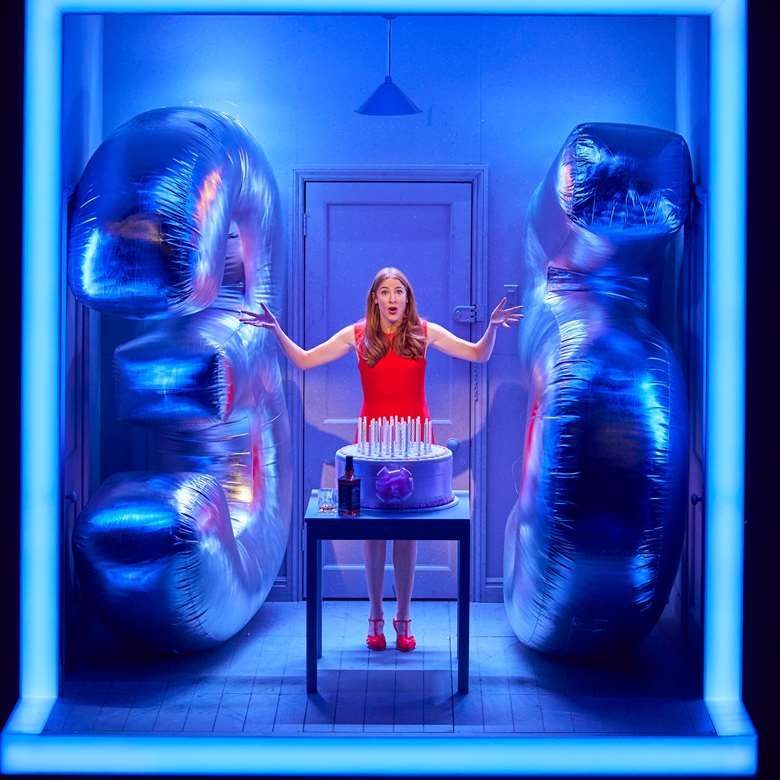Behind the Song: Stephen Sondheim’s ‘Being Alive’ from Company
Wednesday, May 3, 2023
The singer, pianist and songwriter Joe Stilgoe on one of the rare Sondheim works that has found an audience away from the footlights

‘Somebody hold me too close…’
‘Somebody hurt me too deep…’
Stephen Sondheim. Colossus of theatre, revolutionary thinker, crossword-completer, pusher of boundaries, puller of strings, beard-wearer, a rare genius of both words and music, praised to the heavens by the critics but often a mere mortal at the box office. He is no longer with us. It’s quite a hole.
‘Being Alive’ is the closer in Company, a show that always had its problems but seemed to finally settle into its own skin with the recent Olivier- and Tony-winning Marianne Elliott production starring Rosalie Craig (and then Katrina Lenk) as a female Bobbie. Sondheim was there in rehearsals; he loved the reworking, the changing of gender and the new scope it gave the drama.
Maybe it released something in him. People have often alluded (sometimes with short shrift to the man himself) that Company was an autobiographical piece – an allegory for Sondheim’s own unfulfilled quest to find someone to share his life with when writing the show in 1970 with George Furth. ‘Being Alive’ was the apex of this predicament and the emotional ache of the show, but it was his fourth attempt to find a suitable last number. Thank God he kept trying: Sondheim is full of wit and wisdom about the writing process, but I like this one from fellow writer Marilyn Bergman – ‘Songs aren’t written, they’re rewritten.’
The key change is big news – it changes the world of the song
I knew the song before I knew the show. It was one of the rare Sondheim works that found an audience away from the footlights. He often wrote with such detail and particularity for characters and context that it was hard to lift them from the stage, but in this song it hit the mark. Some of the great voices recorded it: Streisand, Dusty Springfield, Lea Salonga, Bernadette Peters… In fact, more women had covered it away from the stage than men, so the precedent was set early on for there to be ambiguity, or, I suppose, relatability in the lyrics. But let’s start with the music.
Sometimes Sondheim sailed close to functional harmony, the kind we know from pop songs, or from lesser composers in the theatre. He never wanted it to be easy, but sometimes he found a simplicity to the harmony and melody which just clicked. I get that from a few others he wrote – ‘Losing My Mind’, ‘Send In The Clowns’, ‘Nothing’s Gonna Harm You’ – but he hated to be predictable and so, often, his music takes a dip into uncharted waters.
With ‘Being Alive’, we’re quite contained, in a happy harmonic box – a song in a major key about very major things but with aching sadness that almost makes the music feel as if it’s in a minor key. He would love the analysis – sometimes writers just write without being aware of the tools they’re using, but I’m certain he knew with every note and every syllable what he was intending to invoke. Sondheim always tried to marry the words and music – ‘content dictates form’ was his biggest thing. Try saying the words out loud and you will get pretty close to the melody he then wrote.
One of the cleverest instincts is a repetition of certain notes. This is something of a Sondheim trademark and, thanks to the relative luxury that comes with a composer being his own lyricist, it means that when he gets the alchemy absolutely right it comes close to perfection. Take the use of the major-seventh note, for example, which reappears with glorious insistence throughout – ‘Someone to sit in my chair / And ruin my sleep / And make me aware / Of being alive…’ The underlined syllables are on that key note. It sounds optimistic, our ears are convincing us it’s leading to the end of the rainbow, but the lyrics tell us otherwise.
And so the song goes on, taking us to that uncertain middle: ‘Make me confused / Mock me with praise.’ The harmony shifts down a tone, not related and a little restless, like we don’t know whether to trust the sentiment. Then we’re back up to the original pitch, the harmonic home, before the build to the key change. This key change is big news. Sometimes people sniff at a key change, particularly a semitone up – they think it’s too obvious. But what this does is change the world of the song. Suddenly Bobbie is in a different frame of mind – the lyrics become more convincingly positive, more certain of the value of not being alone.
Because, as Bobbie says: ‘Being alone is alone / Not alive.’
‘Somebody crowd me with love…’
Oh, this is why he’s the best – crowd me with love! It’s in the details. This is the human condition – this is what love is. This is what Bobbie needs – it’s what we all need. The striving for affection, the desire to be held, to be understood, to be known, to be seen, to be loved. To be alive.
Never miss an issue Musicals magazine – subscribe today
